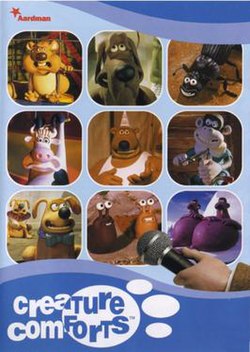Creature Comforts
| Creature Comforts | |
|---|---|
 |
|
| Created by | Nick Park |
| Country of origin | United Kingdom |
| Original language(s) | English |
| No. of series | 2 + 1 film |
| No. of episodes | 27 (list of episodes) |
| Production | |
| Producer(s) | Aardman Animations |
| Running time | 10 minutes |
| Release | |
| Original network |
ITV (UK) CBS/Animal Planet (US) |
| Picture format |
4:3 (1989) 16:9 (2003–2007) |
| Original release |
Original Film: 15 July 1989 Series: 4 June 2003 – 29 January 2006 |
Creature Comforts is a stop motion clay animation comedy mockumentary franchise originating in a 1989 British humorous animated short film of the same name. The film matched animated zoo animals with a soundtrack of people talking about their homes, making it appear as if the animals were being interviewed about their living conditions. It was created by Nick Park and Aardman Animations. The film later became the basis of a series of television advertisements for the UK electricity boards, and in 2003 a television series in the same style was released. An American version of the series was also made.
The original Creature Comforts short film was five minutes long and was conceived and directed by Nick Park and produced by Aardman Animations featuring the voices of British non-actors in the same vein as the "man on the street" Vox Pop interviews. It was produced as part of a series called Lip Synch for Channel 4. The film won Nick Park the Academy Award for Best Animated Short Film in 1990.
The film shows various animals in a zoo being interviewed about their living conditions. These include a depressed gorilla, a Brazilian puma and a young hippopotamus who complain about the cold weather, the poor quality of their enclosures and the lack of space and freedom. By contrast, a tarsier and an armadillo praise their enclosures for the comfort and security they bring, and a family of polar bears talk about both the advantages and disadvantages of zoos for the welfare of animals. Rather than the subject being one-sided or biased towards one view-point, there is a strong balance of opinions in the film, with some interviewees who are happy with their living situation, some who are not, and some who have a neutral opinion.
...
Wikipedia
